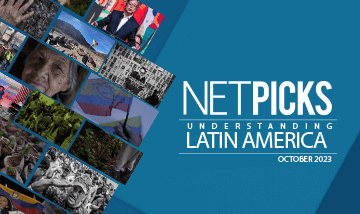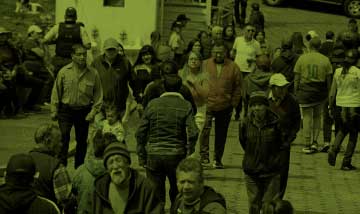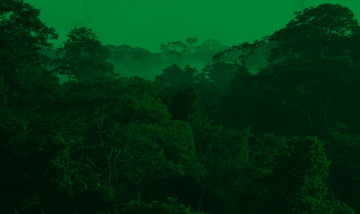Índice
- URUGUAY’S PARADOX: WILL THE PANDEMIC ACCELERATE NEO-LIBERAL POLICIES?
- A MARATHON, NOT A SPRINT: PERU NEEDS FISCAL REFORMS TO QUELL HIGH COVID-19 DEATH RATE
- TRUDGING TOWARDS JUSTICE: THE EL MOZOTE MASSACRE’S DECADES LONG TRIALS
- MEXICAN WOMEN’S PATIENCE SNAPS AT AMLO’S INACTION ON FEMICIDE
- WASHINGTON FIRM RAN FAKE FACEBOOK ACCOUNTS IN VENEZUELA, BOLIVIA AND MEXICO, REPORT FINDS
Understanding Latin America
This month we bring you five articles: from Uruguay, where the pandemic has provided the new right wing government with the chance to implement neoliberal policies; from Peru where inequality and an historic lack of investment in social policy has led to a disastrously high number of Covid-19 victims; from El Salvador, where the authors of the El Mozote massacre, the most infamous of its 1980’s civil war, will finally, perhaps, be brought to justice; from Mexico, where feminists are protesting President Lopez Obrador’s lack of action on violence against women; and finally from Facebookland, where the company has shut down fake sites it claims were being used to influence politics in Bolivia, Venezuela and Mexico.
.
URUGUAY’S PARADOX: WILL THE PANDEMIC ACCELERATE NEO-LIBERAL POLICIES?
Uruguay has been pointed to as an example of good governance and social welfare in a region not noted for such. Structural factors, such as a strong social security net, universal healthcare, high trust in political institutions, and a low density of population, have all contributed to Uruguay’s success. The impression was underlined by the new government’s fast action to contain the Covid-19 pandemic, surprising perhaps given that President Luis Lacalle Pou had only been in office for two weeks before the pandemic hit. Now, while his new right wing government has been criticized for its decision to go ahead with the fiscal adjustment Lacalle Pou promised on the campaign trail, the pandemic has provided him with the perfect opportunity to capitalize on his high approval ratings. The generally strong labor movements have not been able to organize as a result of the pandemic, so ensuring rapid passage through Congress for the “the Law for Urgent Consideration” has thus been relatively easy for Lacalle Pou. The legislation signals a radical move towards a more neoliberal model, and the government is also planning to reduce spending by capping budgets in several sectors and by deregulating some aspects of the economy. As a result, Uruguay has been named by the Economic Commission for Latin America and the Caribbean, ECLAC, as one of the countries that spent the least on combatting the consequences of the pandemic. Meanwhile, on the left, the Frente Amplio is going through a difficult period and may have hard time opposing the budget proposed by a President who popularity has risen as a result of his handling of the health crisis.
Morgan Fairless, September 25th, 2020
https://lab.org.uk/uruguays-paradox-will-pandemic-accelerate-neo-liberal-policies/
.
A MARATHON, NOT A SPRINT: PERU NEEDS FISCAL REFORMS TO QUELL HIGH COVID-19 DEATH RATE
At the beginning of the Covid-19 pandemic, Peru presented itself as an example for the region: moving quickly to implement strict prevention measures, following scientific recommendations and preparing an economic support plan for the most vulnerable. Notwithstanding, the country has become a hotspot for cases of Covid-19, in the process creating a desperate situation in many cities and regions. By the end of August, the country had 28,000 confirmed deaths and more than 600,000 infections, although the official numbers may even be an underestimate. One of the major reasons for the country’s poor performance, says the authors, is that Peru is still plagued by extremely high levels of inequality. For decades, the country has been one of the Latin American countries with the lowest investment in social policies, leading to major disparities in access to social rights, including health and education. The problem is even greater for the country’s indigenous populations, whose enjoyment of rights and social services remains abysmally low. In 2019, poverty among the population with an Indigenous first language was almost double that of those whose first language was Spanish. In rural areas, the poverty rates of Indigenous language speakers are even higher. Resources could be found to remedy the problem in health and educational sectors, say the authors. Higher tax revenue, collected from those most able to pay, such as wealthy individuals and powerful corporations, could help to address the impact of Covid-19, achieve the Sustainable Development Goals, and reduce territorial, racial, ethnic, and gender disparities.
Laura Adriaensens and Sergio Chaparro Hernández, September 11th, 2020
https://www.ipsnews.net/2020/09/marathon-not-sprint-peru-needs-fiscal-reforms-quell-high-covid-19-death-rate/
.
TRUDGING TOWARDS JUSTICE: THE EL MOZOTE MASSACRE’S DECADES LONG TRIALS
Between December 10 and 13 1981, during the country’s civil war, soldiers from El Salvador’s U.S.-trained, Atlacatl Battalion entered the village of El Mozote and other sites, and tortured, raped, and executed close to one thousand civilians, more than half of them children. This incredible brutality may have taken place as part of an attempt to target the Farabundo Martí National Liberation Front (FMLN), high-ranking army officials apparently suspecting local people of sympathy to the FMLN. Although the US embassy may have known about event, says the author, no action was taken until front page stories were published in The New York Times and The Washington Post in 1982. In El Salvador, on the other hand, only in 1990 were there any official attempts to investigate the killings. And while a UN truth commission confirmed in 1992 that the massacre had occurred as reported by victims, the national legislature passed a general amnesty law soon after, effectively preventing crimes being brought to trial. In 2012, the Inter-American Court of Human Rights issued a decision that documented the atrocities, and placed the blame on El Salvador, but no real action was taken until 2016 when the country’s Supreme Court declared the amnesty law to be unconstitutional, finally opening the way for the authors to be brought to trial. However, progress has been slow due to lack of document: the US is suspected to be harboring important files; Salvadorian President Bukele, who once promised transparency now appears to be waffling; and the accused generals are now blaming dead members of the military junta. The case is expected to go to trial later this year.
Felipe de la Hoz, September 18th, 2020
https://elfaro.net/en/202009/el_salvador/24822/Trudging-towards-Justice-The-El-Mozote-Massacre%E2%80%99s-Decades-Long-Trials.htm
.
MEXICAN WOMEN’S PATIENCE SNAPS AT AMLO’S INACTION ON FEMICIDE
Womens groups occupied the National Human Rights building in Mexico City on September 15th, Mexico’s independence day. They were protesting a lack action by the López Obrador government on the wave of rapes, murders and forced disappearances being suffered by women in the country. The occupiers stated that the building will be used as a shelter for female victims of violence until López Obrador, AMLO, takes real action to stop the violence. In response, AMLO has said the women have a political agenda and are backed by ‘conservatives’. He also criticized the occupiers for defacing paintings within the building, but as one woman put it: “The president was indignant about a portrait – but why wasn’t he indignant when my daughter was abused?” This is not the first time major protests have taken place over gender violence. In August 2019, feminist protesters set fire to a police station and a bus terminal in the center of Mexico City after news broke of rapes committed by police. Activists also graffitied the Angel of Independence monument and staged a months-long occupation of Mexico’s National Autonomous University.
Madeleine Wattenbarger, September 16th, 2020
https://www.theguardian.com/global-development/2020/sep/16/mexico-women-activists-human-rights-commission-protest
.
WASHINGTON FIRM RAN FAKE FACEBOOK ACCOUNTS IN VENEZUELA, BOLIVIA AND MEXICO, REPORT FINDS
The media giant Facebook has stated that a Washington-based public relations firm, CLS strategies, used fake Facebook and Instagram accounts to promote Juan Guiadó in Venezuela, and the government of Janine Añez in Bolivia. According to Facebook, CLS’ use of fake accounts contravenes the company’s policy on the use of its platforms for foreign interference. CLS has denied the claims, stating that that its activities do not amount to foreign interference, as its clients were located in the affected countries. Notwithstanding, Facebook has closed 55 accounts, 42 pages and 36 Instagram accounts linked to CLS Strategies that had been used to target politics in Venezuela, Bolivia and Mexico. More than three and a half million dollars was spent in advertising across all three countries. Social media companies were caught flat-footed during the 2016 election, when Russian operatives abused their platforms to spread divisive messages to millions of American voters. Since then, Facebook, Twitter and YouTube have marshaled significant resources to improve their rules prohibiting such behavior. A report released by the Stanford Internet Observatory, a disinformation research group, found that 11 of the accounts targeting Bolivia were opened in February 2020, listing four managers in the United States, one in Bolivia and one in Venezuela. The report also noted that ‘CLS Strategies employees had previous professional ties to opposition political leaders in Venezuela’. The office of Bolivian interim president Janine Áñez, has confirmed that CLS Strategies was contracted “to carry out lobbying in support of Bolivian democracy.”
Craig Timberg and Elizabeth Dwoskin, September 4th, 2020
https://www.washingtonpost.com/technology/2020/09/04/facebook-bolivia-cls/





